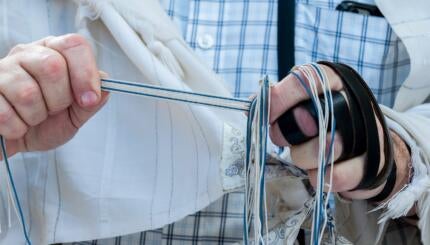Reprinted with permission from JOFA Journal, published by the Jewish Orthodox Feminist Alliance.
The 14 ritual stages of the Passover seder are specific ceremonial acts that can help us reflect on the many rituals that enhance our lives as Jewish women throughout the year.
Kadesh: Blessing the Wine
Kadesh evokes images of women’s voices, which can be heard loud and strong, as we recite kiddush over wine on Shabbat and holidays.
Urhatz: Washing the Hands
The many ways water can be used to wash away ritual impurity are familiar to women. Here we celebrate the generations of women who have served on their community’s hevra kadisha [burial society], performing the final act of kindness for their fellow sisters by cleansing them with water before burial.
With your help, My Jewish Learning can provide endless opportunities for learning, connection and discovery.
Karpas: Dipping the Vegetable
The fresh green vegetables on the seder table remind us that each spring we celebrate the earth’s ability to create life anew, and that we have new celebrations of simchat bat [ceremonies for newborn girls]and bat mitzvah to welcome Jewish girls into the community with joy.
 Yahatz: Breaking the Matzah
Yahatz: Breaking the Matzah
Just as we separate the matzahand set apart a portion, women for centuries have been separating hallah [a portion of dough separated out while baking]. In temple times, the separated dough was given to the priests. As we separate hallah today, we remember the temple and the giving hands of our foremothers who sustained those who served in it.
Maggid: The Narration
As we recount the story of the Exodus, we honor our mothers who sang songs of praise after leaving Egypt. We add our voices to theirs as we serve as ba’alot hamaggid–leaders and tellers of the Passover story.
Rohtza: Washing the Hands
This use of water in the sederto wash away ritual impurity resonates in the minds of women as we think of our own monthly uses of the waters of the mikveh [ritual bath].
Motzi Matzah: Blessing the Matzah
In reciting the blessing over the matzah, we are reminded that we may recite the hamotzi [the blessing before eating bread]for our families each week at the Shabbat table.
Marror: Bitter Herbs
As we experience the bitter taste of the marror, we think of the many agunot in our community whose lives are truly embittered. [Agunot are wives chained to dead marriages by a husband’s disappearance or refusal to grant a divorce.]
Korekh: The Matzah Sandwich
Representing the uniting of the various elements of the sederplate, korekhalludes to the uniting of women’s strengths in gatherings such as women’s tefillah [prayer]and women’s Rosh Hodesh [New Moon]groups. It may also represent women uniting with men in their communities to work in partnership to address inequities and injustice that affect us all.
Shulhan Orekh: The Meal
As the food appeards on the seder table, our thoughts are drawn to the various ways in which women are involved with the ritual observance of kashrut [the dietary laws]. Throughout history, women have been trusted in matters of kashrut, and today, many women turn to other women with halakhic [Jewish-law] questions regarding kashrut and food preparation.
Tzafun: Eating the Afikomen
As the hidden portion of matzahemerges at the end of the seder meal, we celebrate of the emergence of women from the shadows of modern Jewish life. We reaffirm the importance of modesty in the lives of both men and women, even as we take on public communal roles.
Barekh: The Blessing After Meals
The recitation of zimmun [the communal call to the blessing after meals]at the beginning of Birkat Hamazon [the blessing after meals]reminds us that women may lead and participate in our own zimmunim.
Hallel: Praise
As we sing the Hallel [the Psalms of praise],we reflect on the growing power of women’s voices, and the ways in which the voices of Miriam, Deborah, and Hannah resonate in our lives and prayers. We pay tribute to more inclusive minyanun [prayer groups] for providing a place for women to more fully participate in tefillah [prayer] and community leadership.
Nirtzah: Thanksgiving
Concluding with notes of hope and praise, the nirtzahservice reminds us to be thankful for our many blessings as Jewish women. While the struggle for involvement of women in religious ritual may be painful and slow, we learn to cherish each new gain, and are encouraged by the words “Next Year in Jerusalem.”
bat mitzvah
Pronounced: baht MITZ-vuh, also bahs MITZ-vuh and baht meetz-VAH, Origin: Hebrew, Jewish rite of passage for a girl, observed at age 12 or 13.
kashrut
Pronounced: kahsh-ROOT, Origin: Hebrew, the Jewish dietary laws.
mitzvah
Pronounced: MITZ-vuh or meetz-VAH, Origin: Hebrew, commandment, also used to mean good deed.
seder
Pronounced: SAY-der, Origin: Hebrew, literally "order"; usually used to describe the ceremonial meal and telling of the Passover story on the first two nights of Passover. (In Israel, Jews have a seder only on the first night of Passover.)
Shabbat
Pronounced: shuh-BAHT or shah-BAHT, Origin: Hebrew, the Sabbath, from sundown Friday to sundown Saturday.
tefillah
Pronounced: tuh-FEEL-uh or tuh-fee-LAH, Origin: Hebrew, prayer.


